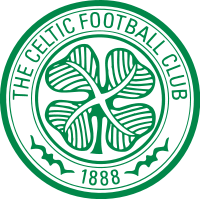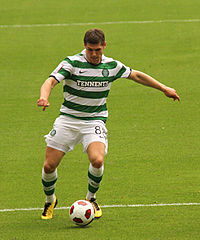Europa League Focus: Celtic Glasgow
Publié le 18 October 2011 à 21h39 byEuropa League, Stade Rennais – Celtic Glasgow, Thursday, 19:00 CET. For their third game in Europa League’s group phase, Rennes is hosting the Celtic Glasgow. Before the game, Jason Milligan, Glaswegian and a contributor for football website frenchfootballweekly.com, introduces the Scottish team for Stade Rennais Online.
History
Founded in 1887 in the Parkhead area, East Glasgow, the Celtic was created by an Irish marist brother, Brother Walfrid, in the aim to collect fund for his charity, “Poor Children’s Dinner Table”, whose aime was to provide food to the poorest children in the Scottish city.
The club was named Celtic to reflect its Irish and Scottish origin, and was soon nicknamed “The Bhoys”, spelled to reflect an Irish pronunciation of the word “Boys”, still in honour to Brother Walfrid’s home country.
The club played its first ever official game in May 1888 against the Glasgow Rangers. A first encounter won 5-2 against the other local team, which would become the club’s historic rival in the context of the “Old Firm”, one of the oldest and fiercest rivalries known to the world of sports.
Since then, the two Glaswegian teams have shared most of the silverware at stake north of Hadrian’s Wall, with the Celtic notably winning 42 titles of Scottish champion, the most recent in 1007-1008. The “Bhoys” have also won 35 Scottish Cups titles, and 14 Scottish League Cups.
With their famous green and white hoops, their colours since 1903, the Celtic grew through the 20th century as a dominant force of football not only in Scotland, but also on the European stage. In 1967, the club was the first British team – and the only Scottish club to this day – to win the European Cup. The Celtic was at its pinnacle, and won all five competitions they played on that season (European Cup, Scottish League, Scottish Cup, League Cup and Glasgow Cup) at the heart of a run of success which would see the club win nine consecutive league titles between 1965 and 1974, and reach another European Cup final in 1970, this time lost to Feyenoord Rotterdam.
Back in the shadow of the Glasgow Rangers in the 1980’s and even more so in the 1990s, the Celtic Glasgow shone again in 2003, when the Scottish team led by Martin O’Neill faced the FC Porto of Jose Mourinho in the final of the UEFA Cup. Followed by an impressive support of about 80,000 fans in Sevilla, the Celtic finally lost 3-2 after extra-time, despite a brace by their star striker Henrik Larsson.
Unfortunately, the 2000’s were also witnessing the decline of Scottish football, proportionally to the rise of the English Premier League. After a last stand in 2007, when Celtic was agonisingly close to qualify for the Champions League’s quarter-finals against the future winner, Milan AC, the end of an era had arrived for the Celtic and the rest of Scottish club football, badly equipped for modern football sportively as well as economically.
Current Form
In a difficult sportive situation, the Celtic has also been under a certain amount of external pressure following the sectarianism scandal which reared its ugly head and has gripped and overshadowed Scottish football once again. Manager Neil Lennon has been under pressure due to the club’s recent form, since they have fallen off the pace in the SPL title race.
Indeed, Celtic’s domestic form so far this season has been relatively inconsistent with the club sitting third in the SPL table so far this season and ten points adrift from rivals Rangers, who sit top of the table on 29 points after 11 games played. This is in spite of a game in hand against newly-promoted Dunfermline.
Preparation for the match on Thursday did not go to plan either, after coming from 3-0 down to draw 3-3 away to Kilmarnock. This means that the club have only won two of their last five fixtures in the SPL, which is not form the Glasgow club are used to. This includes a 2-0 defeat away to Hearts and a 4-2 defeat to Old Firm rivals Rangers.
In Europa League, Celtic’s participation in the competition has caused controversy. Swiss side FC Sion had initially defeated Celtic in the qualifying rounds, only for it to emerge that the club had allegedly fielded ineligible players for the fixtures and were eliminated from the competition by default. This presented Celtic with the golden opportunity of flying the flag for Scotland as the country’s only representatives in European competition this season. Court proceedings for Sion’s reinstatement into the competition are still ongoing.
On a sportive level, after two games, Celtic have the same amount of points as Rennes but did put in an impressive performance against Udinese. An early penalty from South Korean international Ki Sung-Yeung was cancelled out by a late equaliser, also from the penalty spot, by Almen Abdi. In their other fixture in Group I, Celtic were defeated by Atlético Madrid (2-0) after an early goal from Falcao followed by a well-worked Diego goal in the second half.
With Atlético Madrid and Udinese favourites to progress from this group, both Rennes and Celtic will be looking for a victory in this fixture in order to put up a decent fight. Neither side should be underestimated in this match.
Tactics and Players
This season, the club have adopted their tactics depending on opposition, mostly preferring a 4-5-1 or a 4-4-2 line-up and favouring fast, direct transmission of the ball towards the attacking line.
In the goals, usual number one goalkeeper Fraser Forster was dropped for the club’s last Europa League outing against Udinese, with Lukas Zaluska preferred between the sticks. It remains to be seen which goalkeeper Neil Lennon chooses to represent the club in this fixture.
Celtic’s defence is very much in need of some added strength and depth. Swedish international Daniel Majstorovic has plenty of presence at the back for the club but has yet to find a capable partner in the centre of the defence. Charlie Mulgrew, trained at the club and a former Scotland U21 player should start the game alongside the Swede, while Adam Matthews and Mark Wilson could start the game respectively at right-back and left-back. Matthews will play on his pace and attacking input while Wilson, capable of covering both full-back positions, is considered one of the most solid defenders in the Scottish squad.
Midfield is an area of strength for Celtic at the moment, despite the absence of Captain Scott Brown, suffering with an ankle injury. With Ki Sung-Yeung and Biram Kayal putting in impressive performances for the club. Kayal is currently negotiating a new contract amidst interest from other clubs across Europe. Both can cause problems if given space and time on the ball. Ki has scored a number of goals for Celtic from distance. On the sides, young Scottish international James Forrest is one of the team’s main attacking assets, while Joe Ledley, a more defensive midfielder, should start on the left flank. If Neil Lennon decided to strengthen his midfield, the presence of Victor Wanyama is a real possibility, to play as a holding midfielder behind Ki and Kayal.
In attack, the Celtic relies extensively on Gary Hooper, its best goal scorer, which could be partnered with either Anthony Stokes, Mohamed Bangura ou Giorgios Samaras. Bangura is yet to score for Celtic since he joined this summer, while Samaras has only scored two goals in his last thirty-two games for the club.Talking about the Greek international, Neil Lennon recently admitted that his faith in the striker could ultimately force him to be sacked from the role as Celtic boss. Using Stokes and Hooper in the same line-up could show that Celtic intend to attack the match. However, it remains to be seen whether Samaras will make an appearance as a lone striker in the fixture. It is more likely that Gary Hooper will play the lone attacking role.
A man to watch : Gary Hooper
23 year-old striker Gary Hooper has shone since arriving at Celtic Park from Scunthorpe United in a £2.4m deal. The Englishman scored 22 goals in all competitions for Celtic last season (27 goals in 47 games with Celtic) and is able to find the net when chances arise.
He has the strength to cause problems for defences in what is a physical league and could cause problems for Rennes if not dealt with appropriately. Capable of playing as a lone striker or in a partnership, Hooper doesn’t have the experience of a Di Natale or the the statistics of a Falcao, but he remains a permanent danger for the defenders and is a great finisher especially in the one on ones against the keeper.
His explosion at the highest level has been closely followed by the English media who already imagine a future with the Three Lions shirt for him, while several English Premier League clubs such as Newcastle or QPR are working hard behind the scenes to try and attract him back to England this winter.
Thanks to Jason Milligan (http://www.frenchfootballweekly.com)
Photos : Ronnie Macdonald


